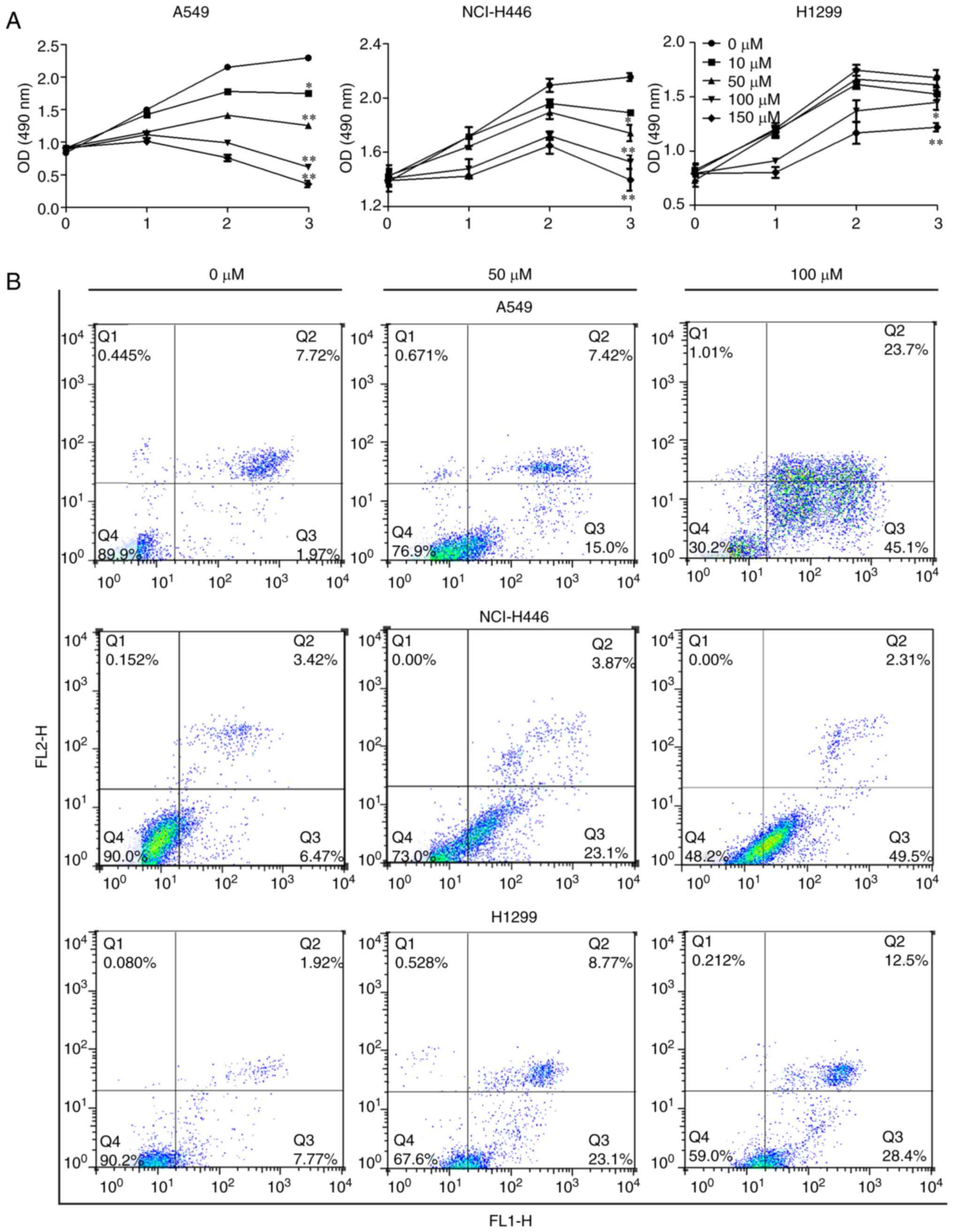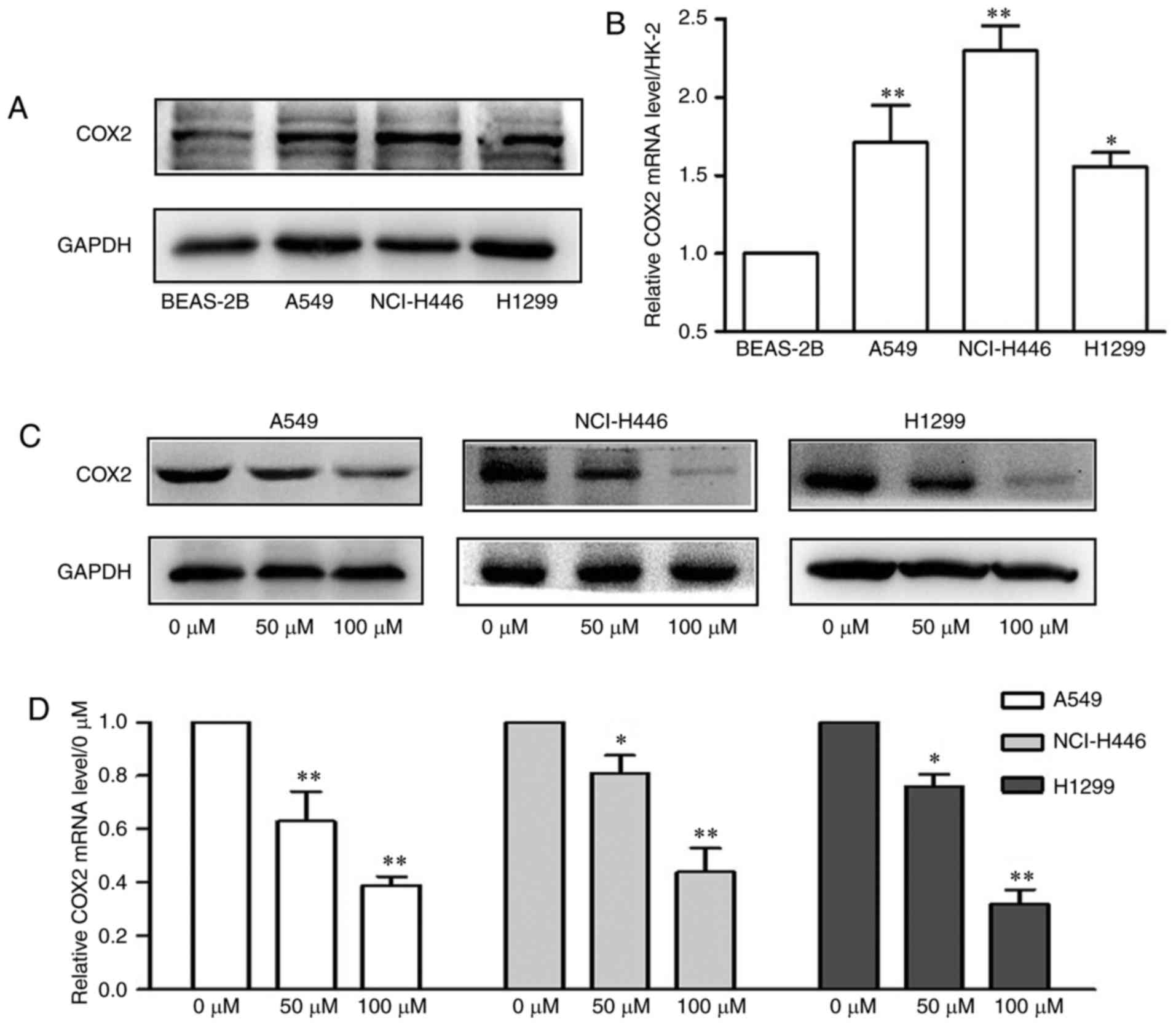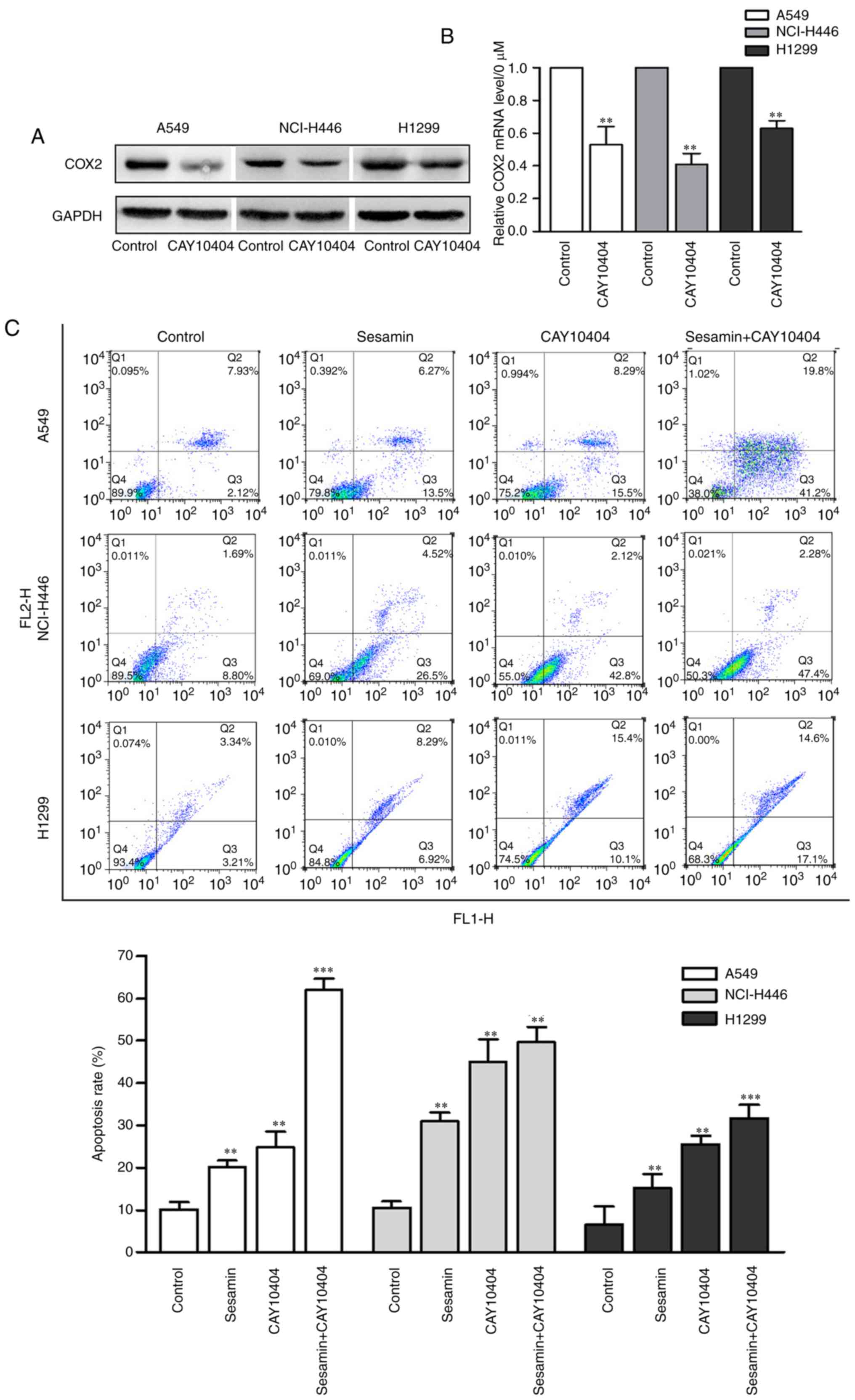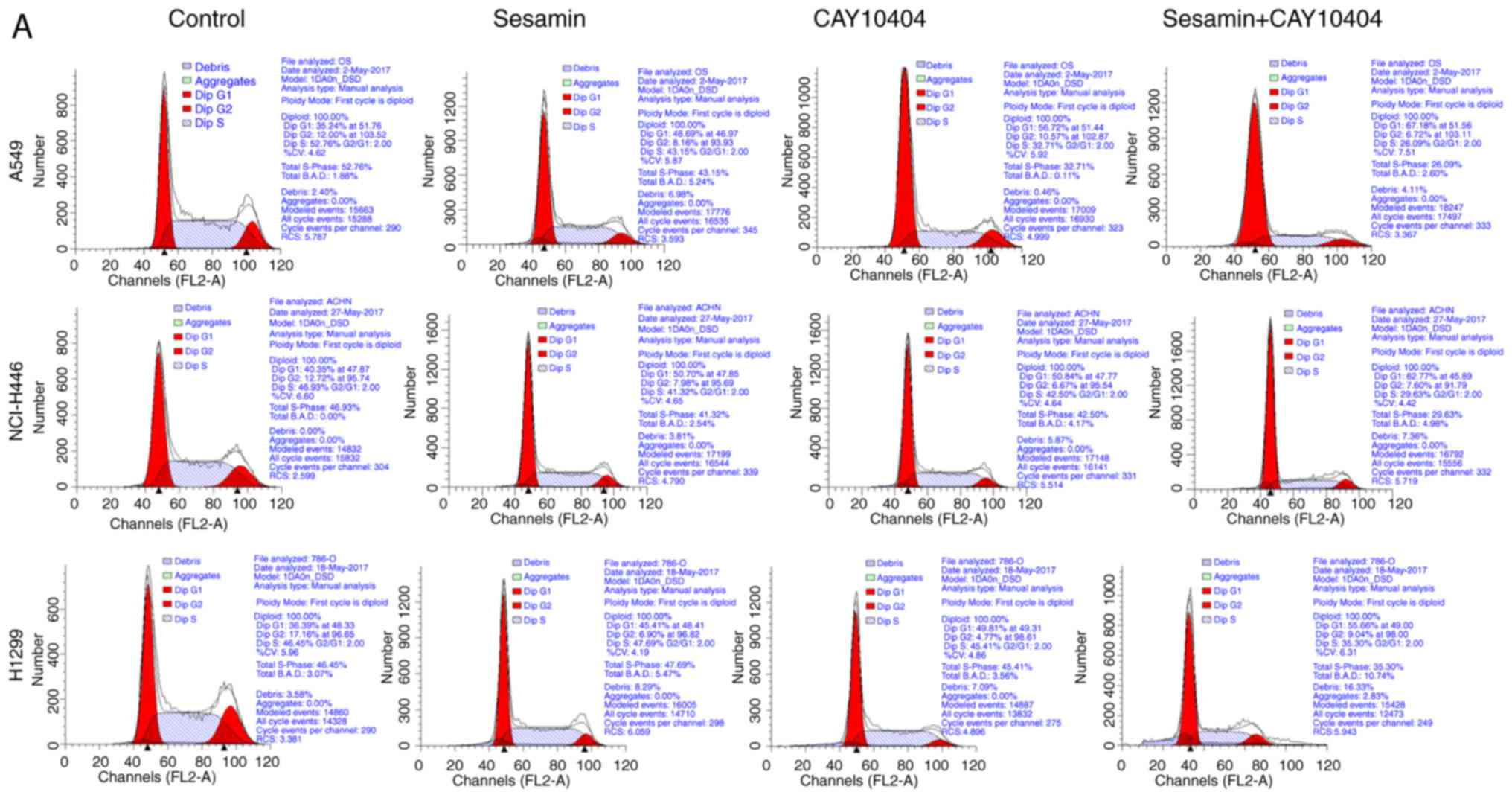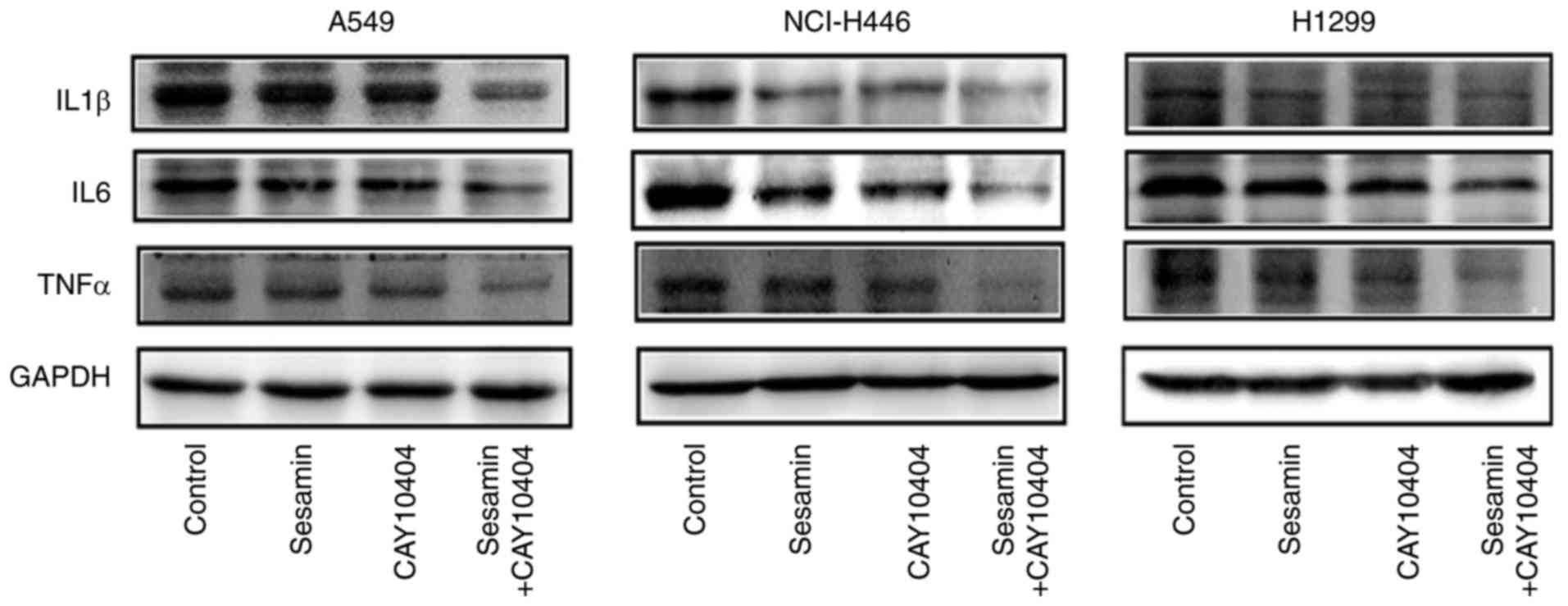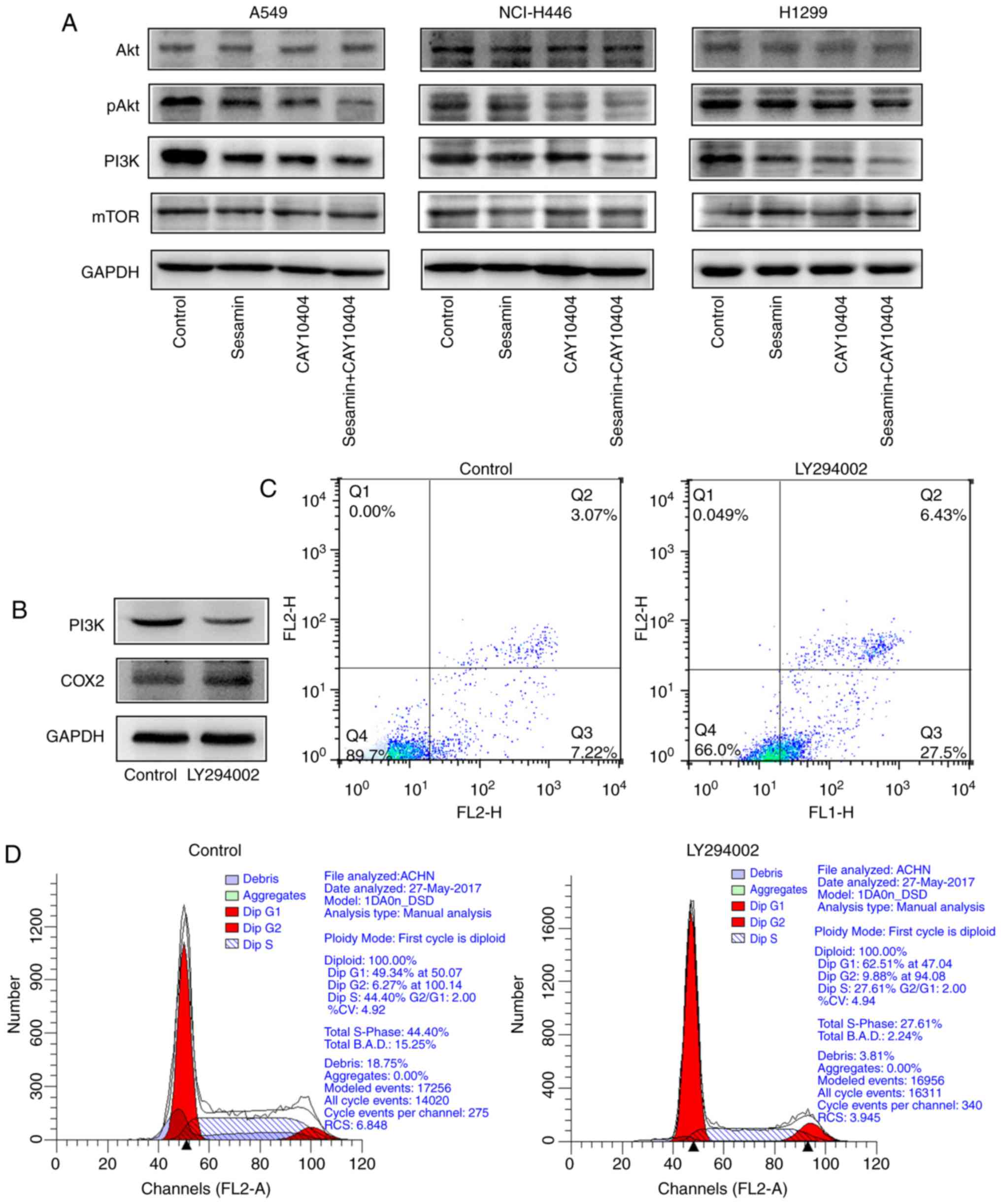|
1
|
Salskov A, Hawes SE, Stern JE, Feng Q,
Jordan CD, Wiens L, Rasey J, Lu H, Kiviat NB and Vesselle H:
Hypermethylation of CCND2 may reflect a smoking-induced
precancerous change in the lung. J Oncol. 2011:9501402011.
View Article : Google Scholar : PubMed/NCBI
|
|
2
|
Siegel RL, Miller KD and Jemal A: Cancer
statistics, 2017. CA Cancer J Clin. 67:7–30. 2017. View Article : Google Scholar : PubMed/NCBI
|
|
3
|
Bao M, Song Y, Xia J, Li P, Liu Q and Wan
Z: miR-1269 promotes cell survival and proliferation by targeting
tp53 and caspase-9 in lung cancer. Onco Targets Ther. 11:1721–1732.
2018. View Article : Google Scholar : PubMed/NCBI
|
|
4
|
Zheng L, Zhou H, Guo L, Xu X, Zhang S, Xu
W and Mao W: Inhibition of NIPBL enhances the chemosensitivity of
non-small-cell lung cancer cells via the DNA damage response and
autophagy pathway. Onco Targets Ther. 11:1941–1948. 2018.
View Article : Google Scholar : PubMed/NCBI
|
|
5
|
Thuy TD, Phan NN, Wang CY, Yu HG, Wang SY,
Huang PL, Do YY and Lin YC: Novel therapeutic effects of sesamin on
diabetes-induced cardiac dysfunction. Mol Med Rep. 15:2949–2956.
2017. View Article : Google Scholar : PubMed/NCBI
|
|
6
|
Fan D, Yang Z, Yuan Y, Wu QQ, Xu M, Jin YG
and Tang QZ: Sesamin prevents apoptosis and inflammation after
experimental myocardial infarction by JNK and NF-κB pathways. Food
Funct. 8:2875–2885. 2017. View Article : Google Scholar : PubMed/NCBI
|
|
7
|
Qiang L, Yuan J, Shouyin J, Yulin L,
Libing J and Jian-An W: Sesamin attenuates
lipopolysaccharide-induced acute lung injury by inhibition of TLR4
signaling pathways. Inflammation. 39:467–472. 2016. View Article : Google Scholar
|
|
8
|
Xu P, Cai F, Liu X and Guo L: Sesamin
inhibits lipopolysaccha-ride-induced proliferation and invasion
through the p38-MAPK and NF-kappaB signaling pathways in prostate
cancer cells. Oncol Rep. 33:3117–3123. 2015. View Article : Google Scholar : PubMed/NCBI
|
|
9
|
Kuang W, Deng Q, Deng C, Li W, Shu S and
Zhou M: Hepatocyte growth factor induces breast cancer cell
invasion via the PI3K/Akt and p38 MAPK signaling pathways to
up-regulate the expression of COX2. Am J Transl Res. 9:3816–3826.
2017.PubMed/NCBI
|
|
10
|
Chun KS and Surh YJ: Signal transduction
pathways regulating cyclooxygenase-2 expression: Potential
molecular targets for chemoprevention. Biochem Pharmacol.
68:1089–1100. 2004. View Article : Google Scholar : PubMed/NCBI
|
|
11
|
Spano JP, Chouahnia K and Morere JF:
Cyclooxygenase 2 inhibitors and lung carcinoma. Bull Cancer.
91(S109-S112)2004.In French.
|
|
12
|
Yang CL, Zheng XL, Ye K, Ge H, Sun YN, Lu
YF and Fan QX: MicroRNA-183 acts as a tumor suppressor in human
non-small cell lung cancer by down-regulating MTA1. Cell Physiol
Biochem. 46:93–106. 2018. View Article : Google Scholar : PubMed/NCBI
|
|
13
|
Yin H, Ma J, Chen L, Piao S, Zhang Y,
Zhang S, Ma H, Li Y, Qu Y, Wang X and Xu Q: MiR-99a enhances the
radiation sensitivity of non-small cell lung cancer by targeting
mTOR. Cell Physiol Biochem. 46:471–481. 2018. View Article : Google Scholar : PubMed/NCBI
|
|
14
|
Jiang SX, Qi B, Yao WJ, Gu CW, Wei XF,
Zhao Y, Liu YZ and Zhao BS: Berberine displays antitumor activity
in esophageal cancer cells in vitro. World J Gastroenterol.
23:2511–2518. 2017. View Article : Google Scholar : PubMed/NCBI
|
|
15
|
Xiao H, Liu Y, Liang P, Wang B, Tan H,
Zhang Y, Gao X and Gao J: TP53TG1 enhances cisplatin sensitivity of
non-small cell lung cancer cells through regulating miR-18a/PTEN
axis. Cell Biosci. 8:232018. View Article : Google Scholar : PubMed/NCBI
|
|
16
|
Livak KJ and Schmittgen TD: Analysis of
relative gene expression data using real-time quantitative PCR and
the 2(−Delta Delta C(T) method. Methods. 25:402–408. 2001.
View Article : Google Scholar
|
|
17
|
Zhuang H, Meng X, Li Y, Wang X, Huang S,
Liu K, Hehir M, Fang R, Jiang L, Zhou JX, et al: Cyclic AMP
responsive element-binding protein promotes renal cell carcinoma
proliferation probably via the expression of spindle and
kinetochore-associated protein 2. Oncotarget. 7:16325–16337. 2016.
View Article : Google Scholar : PubMed/NCBI
|
|
18
|
Yoon KY, Kim KJ, Youn HS, Oh SR and Lee
BY: Brazilin suppresses inflammation via the down-regulation of
IRAK4 in LPS-stimulated Raw264.7 Macrophage. J Food Nutri Res.
3:575–580. 2015. View Article : Google Scholar
|
|
19
|
Alam SK, Astone M, Liu P, Hall SR, Coyle
AM, Dankert EN, Hoffman DK, Zhang W, Kuang R, Roden AC, et al:
DARPP-32 and t-DARPP promote non-small cell lung cancer growth
through regulation of IKKα-dependent cell migration. Commun Biol.
1:432018. View Article : Google Scholar
|
|
20
|
Kong X, Ma MZ, Zhang Y, Weng MZ, Gong W,
Guo LQ, Zhang JX, Wang GD, Su Q, Quan ZW and Yang JR:
Differentiation therapy: Sesamin as an effective agent in targeting
cancer stem-like side population cells of human gallbladder
carcinoma. BMC Complement Altern Med. 14:2542014. View Article : Google Scholar : PubMed/NCBI
|
|
21
|
Akl MR, Ayoub NM and Sylvester PW:
Mechanisms mediating the synergistic anticancer effects of combined
γ-tocotrienol and sesamin treatment. Planta Med. 78:1731–1739.
2012. View Article : Google Scholar : PubMed/NCBI
|
|
22
|
Deng P, Wang C, Chen L, Wang C, Du Y, Yan
X, Chen M, Yang G and He G: Sesamin induces cell cycle arrest and
apoptosis through the inhibition of signal transducer and activator
of transcription 3 signalling in human hepatocellular carcinoma
cell line HepG2. Biol Pharm Bull. 36:1540–1548. 2013. View Article : Google Scholar : PubMed/NCBI
|
|
23
|
Harikumar KB, Sung B, Tharakan ST, Pandey
MK, Joy B, Guha S, Krishnan S and Aggarwal BB: Sesamin manifests
chemopreventive effects through the suppression of NF-kappa
B-regulated cell survival, proliferation, invasion, and angiogenic
gene products. Mol Cancer Res. 8:751–761. 2010. View Article : Google Scholar : PubMed/NCBI
|
|
24
|
Dhakal HP, Naume B, Synnestvedt M, Borgen
E, Kaaresen R, Schlichting E, Wiedswang G, Bassarova A, Holm R,
Giercksky KE and Nesland JM: Expression of cyclooxygenase-2 in
invasive breast carcinomas and its prognostic impact. Histol
Histopathol. 27:1315–1325. 2012.PubMed/NCBI
|
|
25
|
Karavitis J, Hix LM, Shi YH, Schultz RF,
Khazaie K and Zhang M: Regulation of COX2 expression in mouse
mammary tumor cells controls bone metastasis and PGE2-induction of
regulatory T cell migration. PLoS One. 7:e463422012. View Article : Google Scholar : PubMed/NCBI
|
|
26
|
Shimizu S, Fujii G, Takahashi M, Nakanishi
R, Komiya M, Shimura M, Noma N, Onuma W, Terasaki M, Yano T and
Mutoh M: Sesamol suppresses cyclooxygenase-2 transcriptional
activity in colon cancer cells and modifies intestinal polyp
development in Apc (Min/+) mice. J Clin Biochem Nutr. 54:95–101.
2014. View Article : Google Scholar : PubMed/NCBI
|
|
27
|
Wang R, Wang X, Lin F, Gao P, Dong K and
Zhang HZ: shRNA-targeted cyclooxygenase (COX)-2 inhibits
proliferation, reduces invasion and enhances chemosensitivity in
laryngeal carcinoma cells. Mol Cell Biochem. 317:179–188. 2008.
View Article : Google Scholar : PubMed/NCBI
|
|
28
|
Li B, Li X, Xiong H, Zhou P, Ni Z, Yang T,
Zhang Y, Zeng Y, He J, Yang F, et al: Inhibition of COX2 enhances
the chemosensitivity of dichloroacetate in cervical cancer cells.
Oncotarget. 8:51748–51757. 2017.PubMed/NCBI
|
|
29
|
Chan MW, Wong CY, Cheng AS, Chan VY, Chan
KK, To KF, Chan FK, Sung JJ and Leung WK: Targeted inhibition of
COX-2 expression by RNA interference suppresses tumor growth and
potentiates chemosensitivity to cisplatin in human gastric cancer
cells. Oncol Rep. 18:1557–1562. 2007.PubMed/NCBI
|
|
30
|
Liu S, Zhang C, Zhang K, Gao Y, Wang Z, Li
X, Cheng G, Wang S, Xue X, Li W, et al: FOXP3 inhibits cancer stem
cell self-renewal via transcriptional repression of COX2 in
colorectal cancer cells. Oncotarget. 8:44694–44704. 2017.PubMed/NCBI
|
|
31
|
Shimada K, Anai S, Marco DA, Fujimoto K
and Konishi N: Cyclooxygenase 2-dependent and independent
activation of Akt through casein kinase 2alpha contributes to human
bladder cancer cell survival. BMC Urol. 11:82011. View Article : Google Scholar
|















